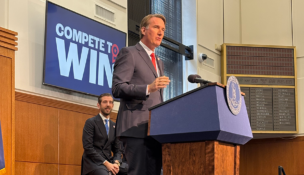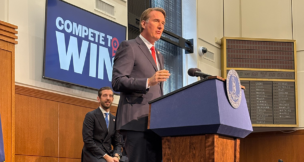Innovation, capital key to rural growth, Barkin and Warner say
Richmond Fed chief, Sen. Mark Warner suggest solutions to spur development
Innovation, capital key to rural growth, Barkin and Warner say
Richmond Fed chief, Sen. Mark Warner suggest solutions to spur development
There’s hope for economic growth in rural areas despite their challenges, Federal Reserve Bank of Richmond President and CEO Tom Barkin and U.S. Sen. Mark Warner said Wednesday during the Fed’s 2023 Investing in Rural America conference in Roanoke.
Rural areas could overcome economic development challenges, particularly housing shortages and lack of broadband access, with innovation, Barkin said, while Warner focused on access to capital as a solution.
“Simply put, the math just isn’t working to put new residents into housing that’s affordable for them. We don’t have enough supply, and building is getting ever more expensive with construction, interest and labor costs up,” Barkin said.
Small towns have additional challenges with housing because existing housing is often older construction, rough terrain makes it difficult to build, and absentee landlords can slow or prevent construction — all of which can lead developers to build elsewhere.
But localities can work to develop buildable sites for home developers or redevelop vacant commercial or municipal spaces, Barkin said. A Carroll County redevelopment provides an example: The county donated a high school, and Virginia Housing Development Authority helped identify a developer — Landmark Asset Services Inc. — and offered permanent financing at a below-market rate. Landmark redeveloped the high school into 51 affordable housing units.
On the federal level, there’s broad bipartisan support for some housing initiatives, Warner said.
One newer initiative that could help, Warner said, is the Neighborhood Homes Investment Act. Introduced by Sens. Rob Portman, R-Ohio, and Ben Cardin, D-Maryland, the act would create a federal tax credit to cover the cost between building or renovating a home in distressed neighborhoods and the price at which the homes could be sold.
“If you look at rural communities … virtually all over Virginia,” Warner said, “it is, not only the need for additional housing stock, but we’ve got a lot of old housing stock … that just isn’t fit to live in. So is there a way rather than starting from scratch entirely, but to think about putting a tax rate in place that will allow that reconstruction back into open market rate but also in a way that makes it happen?”
High-speed, reliable broadband is a necessity for any rural growth, Barkin and Warner said, an issue Barkin also touched on in 2019. Under former Gov. Ralph Northam, Virginia allocated more than $700 million of its almost $4.3 billion in American Rescue Plan Act funds toward broadband expansion. Nationally, the Infrastructure Investment and Jobs Act provides $65 billion to expand broadband access and subsidize the cost for low-income households.
“The bottom line on this issue is if we don’t get at least 97 to 98% broadband connectivity within the next three to four years in all of our states, at both high speed and affordability, then it’s going to be all on us in a failure of execution, because it’s not a failure of bringing capital to the table,” Warner said.
Another side of economic development is workforce cultivation, which small towns need to focus on to draw employers, Barkin said. When deciding where to locate big projects, companies seem to have shifted their primary focus from state incentives to talent.
One way small towns can help develop the local workforce and encourage entrepreneurs is by incentivizing workers to relocate to and work in their localities, Barkin said. West Virginia is testing a direct incentive: The Ascend West Virginia program pays select people to move to the state, providing $12,000 over the first two years, free access to a coworking space and free outdoor recreation and gear for a year.
But small towns can also incentivize local workers by creating access to affordable child care and transportation, he said, like the United Way of Southwest Virginia has through its child care initiative.
Wilson, North Carolina, implemented a successful transportation initiative, working with Via Transportation Inc. to replace its traditional bus system with an on-demand microtransit service that takes riders from curb-to-curb quickly for a low price. About half of those rides are to or from work, Barkin said.
Barkin lauded the Danville-area Great Opportunities in Technology and Engineering Careers (GO TEC) program for its work building a talent pipeline for Virginia target sectors, like health care and robotics. The program educates students in middle school about career pathways and relevant equipment. When they reach high school, students can complete industry certification programs.
Another key piece of rural revitalization is providing capital for entrepreneurs, Warner said, adding that such funding disproportionately goes to urban areas. In fiscal year 2021, Congress gave the Treasury Department $12 billion for Community Development Financial Institutions (CDFIs), of which Virginia has 16, he said, and Minority Depository Institutions. Legislation could help CDFIs by offering tax credits for longer-term capital deposits, provide CDFIs with funding for back office help and create a secondary market for CDFIs to sell debt, he said.
“The nature of many of these loans are bespoke to start with, and how can we then take this effort of bespoke-based loans, package them together and bring them to a secondary market?” Warner said. A secondary market or intermediary could package, or securitize, CDFI assets for investors. CDFIs would be able to gain a loan, sell it off and use the capital it receives to continue making loans without adding to their debt, a Local Initiatives Support Corp. paper explains.
Rural areas also need to develop pitches for companies and workers to locate and stay, Barkin said, citing Southwest Virginia, which has promoted its Crooked Road heritage music trail, the historic Barter Theatre in Abingdon, the Spearhead Trails for outdoor adventure and wineries, breweries and shopping for post-adventure activities.
“The good news is that remote work puts a lot more small towns in the competitive set, and that small towns offer a sense of place and community that many of today’s workers want, so long as they can also get the housing, broadband and amenities that they need,” Barkin said.
P
















